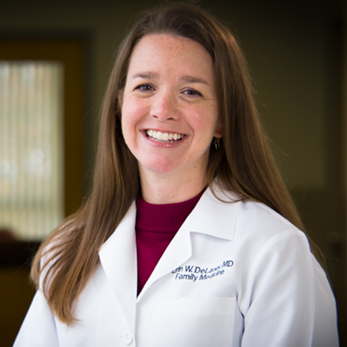 Erin DeLaney, M.D.
Erin DeLaney, M.D.
Primary care experts in the Department of Family and Community Medicine work each day to educate patients on the best ways to care for themselves. Because August is National Immunization Awareness Month, Erin DeLaney, M.D., vice-chair for clinical affairs and quality and assistant professor, and Sameera Davuluri, M.D., medical director for UAB Family Medicine Hoover and assistant professor, offer top tips for staying up to date on necessary immunizations.
Individuals should consider immunizations when thinking about personal and community health.
“Many diseases have been eradicated because of vaccines,” noted Davuluri. “Avoiding common immunizations or vaccines can expose patients to more than short term discomfort from being sick as many of these preventable illnesses have lifelong impacts on health.”
DeLaney pointed out that there are individuals who are unable to receive immunizations because of risk factors, age or other medical reasons. By staying up to date on immunizations, individuals positively impact community health by increasing immunity and decreasing the spread of these diseases.
 Sameera Davuluri, M.D.
Sameera Davuluri, M.D.
Talk with a primary care provider about receiving immunizations.
Both DeLaney and Davuluri encourage patients to ask questions and talk with their primary care providers about which immunizations are right for them. Common immunizations that the Center for Disease Control and Prevention (CDC) encourages for adults include:
• Influenza (flu)
• T-dap (Tetanus, Diptheria, Pertussis)
The CDC and providers like DeLaney and Davuluri also recommend other vaccines for patients over 50 years of age:
• Pneumococcal polysaccharide (PPSV23)
• Shingles vaccines
Primary care physicians may suggest other vaccinations or preventative immunizations during one-on-one consultations with their patients. When speaking with younger patients, DeLaney encourages HPV vaccines.
“The HPV vaccine can prevent cervical cancer, and is especially important for young adults to consider,” she noted.
COVID-19 vaccines can be combined with other vaccinations now, according to the CDC.
“If patients wish to receive the COVID-19 vaccine, they no longer have to wait 14 days between receiving it and other vaccinations,” said DeLaney. “By combining your vaccinations, you can protect yourself and others conveniently during your annual exam or regularly scheduled appointment.”
Both physicians also mentioned that while the COVID-19 vaccine is free for everyone, Alabama Public Health and most insurance providers cover or offset the cost of common immunizations for patients.
Healthcare providers are here to help.
There can be a lot of questions associated with vaccinations and how patients can best protect themselves and their families. The Department of Family and Community Medicine’s faculty and clinical providers are there to provide support and education to patients.
“As a doctor, I always do my best to address questions in a kind and honest manner,” said Davuluri. “I am here to provide a well-researched recommendation for my patients and I do not take that lightly. The recommendations that I give in my clinic are given with the same care and attention as the choices I make with my own family and their health.”